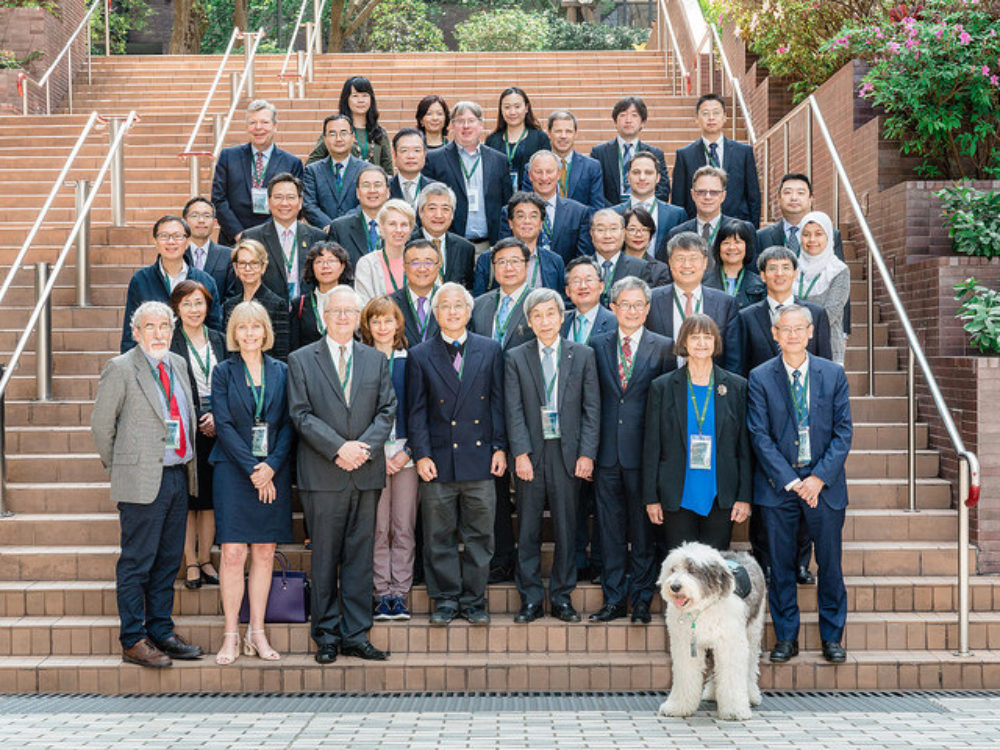APRU Provosts’ Forum 2018 – The Future of the University
The 4th APRU Provosts’ Forum was by The University of Hong Kong on March 11 to 13, 2018.
APRU PROVOSTS’ FORUM: UNIVERSITIES SHOULD PRESENT THEIR SOCIAL VALUE TO COMMUNITIES, DELEGATES SAID
HONG KONG – Universities should give more thought on promoting and presenting social and economic value of their research to the public through collaborations between institutes from different regions, some delegates said in the Provosts’ Forum held by the Association of Pacific Rim Universities (APRU).
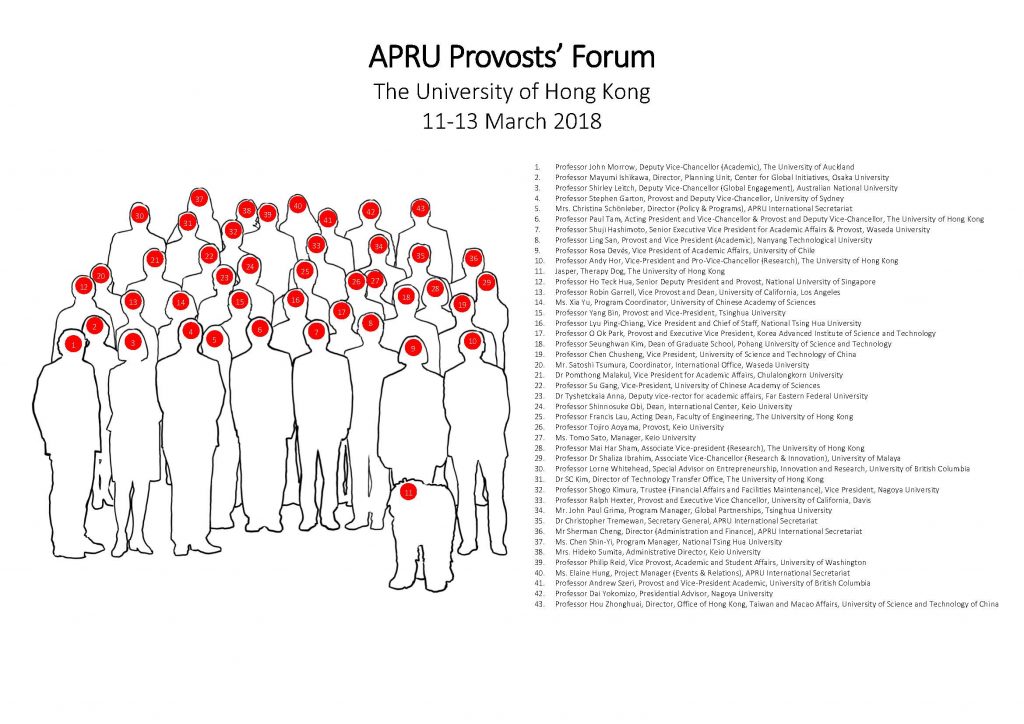
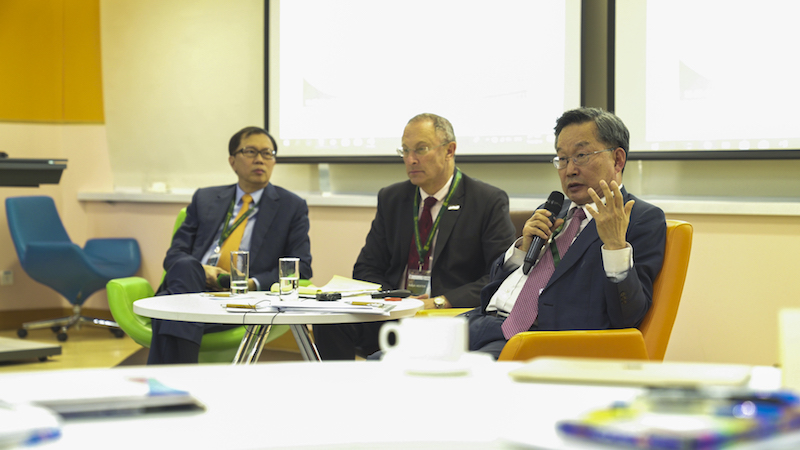
Panel on the role of present and future provosts as facilitators and transformers
Provosts and administrative staff of 24 campuses around the Asia Pacific gathered on March 12 at The University of Hong Kong to discuss obstacles faced by APRU members, and the future of higher education system.
During the discussion about the future of high-impact research and innovation, San Ling, Provost of Nanyang Technological University, talked about the application-driven research projects the university has done in cooperation with technology industry in Singapore. “These translational works…teach students how their research can be linked to real life,”Ling said, highlighting the importance of having good partnerships with local and global industries. Ling mentioned a famous project in Singapore in which a filmmaker was hired to “understand the science, bring it to the public, and look back and forth.”
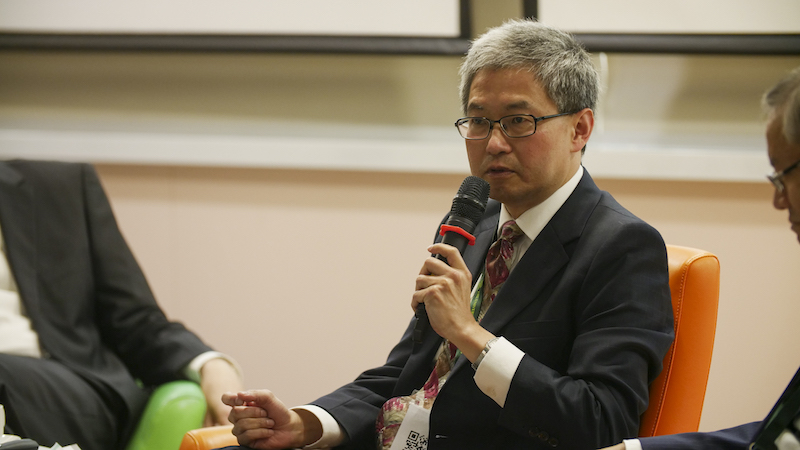
San Ling, Provost of Nanyang Technological University
According to Ling, it is crucial to help the public understand what research projects are about, and optimize the university’s resource allocation to create more impact on the whole community and society. Also, Ling emphasized the value of interdisciplinary collaboration when it comes to ethical issues and policies as a safeguard of technological research.“Involvement of social science cannot be enough. It has to be throughout the process,” Ling added.
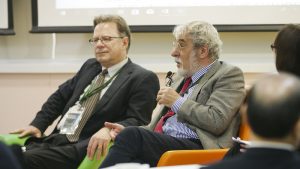
Christopher Tremewan, Secretary General and John Morrow, Deputy Vice-Chancellor of the University of Auckland (L-R)
John Morrow, Deputy Vice-Chancellor of the University of Auckland, said that “community [should be] viewed as a partner in [research-related] activities, not merely as a recipient”. Morrow pointed out that it is necessary for administrative staffers to hold a long-term view when considering the potential and interest of academics in order to integrate research with the needs of communities.
Ralph Hexter, Provost of the University of California, Davis, said that the U.S. has seen a trend of higher education institutes being increasingly privatized, given that the government seems to be less interested in any kind of public investment. “More and more people hold that higher education is not a public good, but a private one,” Hexter said. He talked further about the struggle to keep a balance between state support and independence of academic research, saying that “the more state legislature gives us, the more they seem to want to control us”.
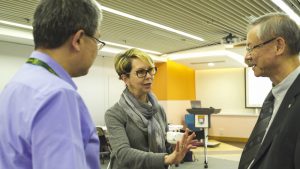
Andy Hor, Vice President of The University of Hong Kong, said that Hong Kong government shows a “dangerous” change of attitudes in recent years when it comes to allocating funds to local universities. “(The city’s government) care about how much money are spent on local students in particular,” Hor said, pointing out that government has doubt about the benefit of international student exchange programs.
KEY ISSUE TWO: CROSS-NATIONAL STUDENT EXCHANGE
Chen Chusheng, Vice President of the University of Science and Technology of China, said that postgraduate students at USTC are less willing to pursue PhD degrees abroad in recent years, which may be attributed to a growing sense of nationalism of their parents. In response to this trend, the university is trying to attract more students to participate in summer exchange programs during which they can obtain first-hand experiences of studying overseas, according to Chen. “For some students, attending these programs did change their mind,” he added.
When speaking about the situation of international students, John Morrow from the University of Auckland said that it has become a “tricky issue” for Australian universities considering the shifting attitude of the government. According to Morrow, Australian government is now more cautious of accepting overseas students due to security concerns and the country’s less welcoming policies towards immigrants.
Shirley Leitch, Deputy Vice-Chancellor of Australian National University, said that there are concerns about whether Australian universities are “too successful” in terms of attracting international students, as they have become financially dependent on international investment when doing research.
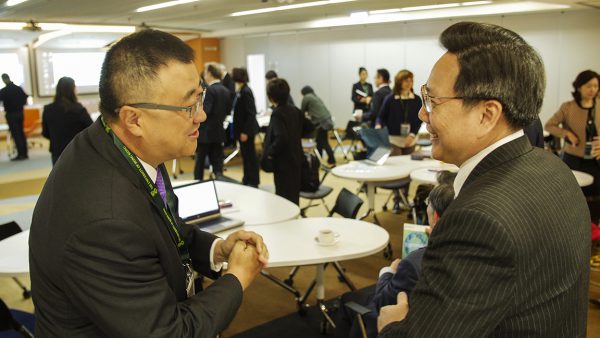
KEY ISSUE THREE: STUDENTS PARTICIPATION IN EXPLORING THE FUTURE
Ralph Hexter from the University of California, Davis held that teaching style should be more student-oriented by understanding “who our students are [and] what they came to the university for”. He stressed the importance of constantly being in dialogue with students in order to identify their needs.
“We are trying to help [the faculties] understand that the world is not the way it was when they were students, and just teaching in the same way they were may not necessarily lead to success for their students,” Hexter said.
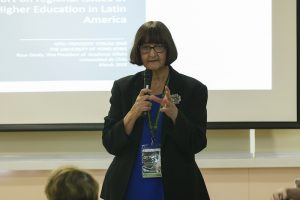
Rosa Devés, Vice President of academic affairs of the University of Chile
Rosa Devés, Vice President of academic affairs of the University of Chile, pointed out that student participation is crucial in determining how universities should adapt to changes in the society. According to Devés, the key to the development of universities is “to give students a voice [and] look at the future together with them”.
CONCLUSION: UNIVERSAL CHALLENGES AND COLLABORATIVE EFFORTS
The issues that delegates touched upon during the forum include state and private funding, relation with government, nationalism and international academic activities, the influence of technology boom on the future of higher education, and social responsibilities of universities, many of which are universal in campuses from a variety of regions.
An APRU provosts’ statement is to be published on the basis of the two-day forum, which focuses on networking and collaboration among APRU members such as launching scholars program.
“Generally, I’m struck…[by] the common themes that emerged about identifying an appropriate narrative, and the need for us to demonstrate the service we provide to communities,” John Morrow said during the round-up session.
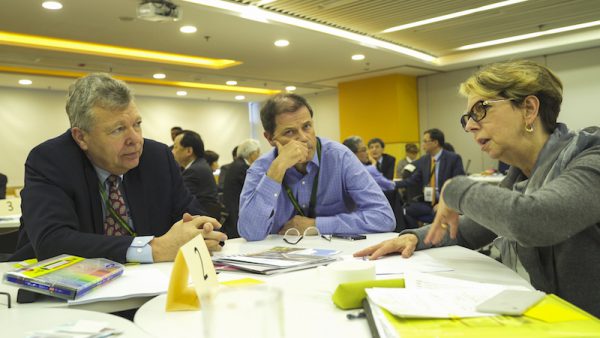
Robin Garrell, Vice Provost of University of California, Los Angeles, said that there are opportunities for APRU to explore practices that help break down barriers that deter institutes with different backgrounds in various regions from collaboration. According to Garrell, the value of conversations taking place in this forum lies in the diversity and the universality of APRU members.
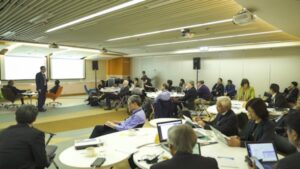
Founded in 1997, APRU has 50 members of leading research universities from 17 economies in the Asia-Pacific region. Its provosts’ forum this year focuses on changing student profiles, development of technology and the need to prepare university graduates for increasingly competitive job market. The University of Hong Kong is the host of APRU Provosts’ Forum 2018, themed “the Future of University”, which lasted for three days from March 11 to 13.
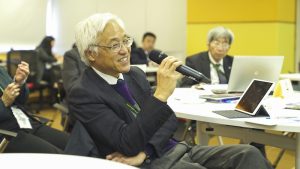
Paul Tam, Acting President and Provost, The University of Hong Kong
MATERIALS OF THE FORUM
SESSION 1 REGIONAL ISSUES FACED BY APRU MEMBERS
Regional Issues on Higher Education in Asia: An Example of USTC
Prof. Chen Chusheng, Vice President, University of Science and Technology of China
Report on regional issues of Higher Education in Latin America
Prof. Rosa Devés, Vice President of Academic Affairs, University of Chile
Two Key Issues Facing the Australasian Higher Education Sector
Prof. John Morrow, Deputy Vice-Chancellor (Academic), The University of Auckland
SESSION 2 THE FUTURE OF HIGH-IMPACT RESEARCH AND INNOVATION
HIBAR Research: What it is, why more of it is need, and how this might be accomplished.
Prof. Lorne Whitehead, Special Advisor on Entrepreneurship, Innovation and Research, University of British Columbia
ROUND-UP SESSION: KEY ISSUES AND CHALLENGES FOR THE FUTURE
Prof. John Morrow, Deputy Vice-Chancellor (Academic), The University of Auckland
SESSION 4 NETWORKS AND COLLABORATION
Osaka University’s Vision 2021: Five Pillars of Openness
Prof. Mayumi Ishikawa, Director, Planning Unit, Center for Global Initiatives, Osaka University
Grand Challenges: Transformative research on the world’s most intractable problems
Prof. Shirley Leitch, Deputy Vice-Chancellor (Global Engagement), Australian National University
Public University Partnership Ecosystems
Prof. Robin Garrell, Vice Provost and Dean, University of California, Los Angeles
SESSION 5 DISPERSING THE BENEFITS OF INTERNATIONALISATION LOCALLY AND GLOBALLY
Higher Education: A Global Perspective
Prof. Kai-Ming Cheng, Emeritus Professor, Division of Policy, Administration and Social Sciences Education, The University of Hong Kong
What benefits do universities offer locally and globally?
Prof. Rosa Devés, Vice President of Academic Affairs, University of Chile
SESSION 6 THE ROLE OF PRESENT AND FUTURE PROVOSTS AS FACILITATORS AND TRANSFORMERS
Prof. O Ok Park, Provost and Executive Vice President, Korea Advanced Institute of Science and Technology
APRU PROVOSTS’ FORUM 2018 STATEMENT
As a consortium of leading research universities of the highly diverse Asia-Pacific region, APRU universities, we are committed to promoting the public good locally and globally.
While each university faces challenges in its own context, APRU universities acknowledge the similarity of many issues across national borders and appreciate the significance of addressing regional and global challenges of increasing cultural parochialism and institutional complexity.
By providing world class environments that facilitate teaching, learning, research and social inclusion, we translate leading-edge research and produce the next generation of leaders to address the challenges of the 21st century.
APRU universities can network and collaborate on:
– sharing resources (e.g. data and online courseware)
– sharing best practices in teaching and learning
– enhancing faculty, staff and student performance
– crafting narratives that address issues of social justice, diversity, equity and access
– sharing practices on how to address these issues both within and beyond the network
– crafting narratives that support higher education and best represent our engagement and impact.
Specifically, APRU could facilitate across the network:
– student and faculty mobility (e.g. APRU Scholars Program, group-based study abroad program);
– multi-disciplinary and cross-border collaboration in both teaching and learning; and
– narratives that best represent impact to diverse stakeholders.
April 2018

